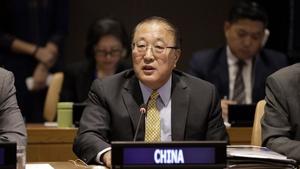 Zhang Jun, China's permanent representative to the UN, speaks at UN headquarters in New York, Sept 12, 2019. (PHOTO / XINHUA)
Zhang Jun, China's permanent representative to the UN, speaks at UN headquarters in New York, Sept 12, 2019. (PHOTO / XINHUA)
UNITED NATIONS - The adoption of a UN Security Council resolution on COVID-19 is a victory of multilateralism, said a Chinese envoy on Wednesday.
At this critical moment of a global fight against COVID-19, the Security Council is duty-bound to take action to tackle the negative impact of the disease on international peace and security. The adoption of Resolution 2532 shows the council's ability to act and its leadership, and represents a victory of multilateralism, said Zhang Jun, China's permanent representative to the United Nations, in his explanation of vote.
China has been constructively engaged in the consultations for the resolution, worked tirelessly with most of the council members to build widest possible consensus, and showed maximum flexibility
The resolution has not come easily. A certain council member has insisted on a unilateral stance, ignoring the call of the international community. This country went back on its words and broke its promise, delaying the process of consultations again and again, said Zhang.
As a result, the Security Council was hampered from taking action. This country has also refused to lift unilateral sanctions against relevant countries, turning a blind eye to the call of the secretary-general and countries around the world. This has worsened the suffering of innocent civilians and the humanitarian crisis in some countries and regions amid COVID-19, said Zhang.
READ MORE: Chinese UN mission rejects US accusations on human rights
From the very beginning, China has been supportive of the secretary-general's appeal for a global cease-fire and the UN Global Humanitarian Response Plan, both of which are endorsed by the resolution, said Zhang.
China has been constructively engaged in the consultations for the resolution, worked tirelessly with most of the council members to build widest possible consensus, and showed maximum flexibility. As a result, the council has managed to overcome all obstacles and sent a positive message of solidarity and cooperation at this difficult time, he said.
Resolution 2532, which won the unanimous support of the 15 members of the council, demands a general and immediate cessation of hostilities in all situations on the Security Council's agenda. It calls on all parties to armed conflicts to engage immediately in a humanitarian pause for at least 90 consecutive days, in order to enable the delivery of humanitarian assistance, provisions of related services, and medical evacuations.
China calls on the international community to seize the opportunity of the adoption of the resolution to encourage parties to conflicts to respond to the secretary-general's appeal for a global cease-fire, immediately cease hostilities, work together to combat COVID-19, save lives, commit to resolving disputes peacefully, ensure the delivery of humanitarian assistance and strengthen the safety and security of peacekeepers, said Zhang.
China welcomes the inclusion in the resolution of the concept of putting people at the center
China welcomes the inclusion in the resolution of the concept of putting people at the center, which reflects the demands and concerns of developing countries and is conducive to addressing the root causes of conflict, he said.
ALSO READ: UN Security Council adopts resolution on COVID-19
China appreciates that the Security Council Resolution refers to GA Resolution 74/270, which reflects member states' full recognition of the central role played by the United Nations and the World Health Organization in the global fight against COVID-19, he said.
The council's adoption of the resolution once again proves that multilateralism is the only right choice for a world faced with multiple challenges, while unilateralism has no support and will only come to a dead end, he said.
At this critical juncture, China firmly takes the side of multilateralism, the vast majority of member states, and fairness and justice. China calls on all countries to envisage a global community with a shared future, advance multilateralism, strengthen solidarity and cooperation, and uphold the purposes and principles of the UN Charter and the UN-centered international system to jointly create a better future for mankind, he said.


